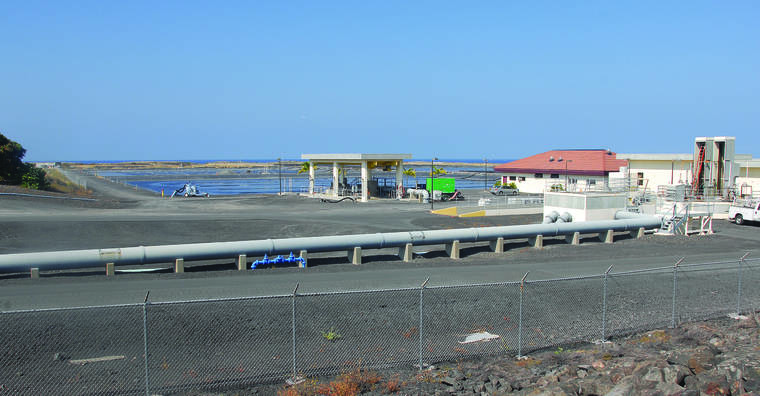Casting a wary eye toward a recent U.S. Supreme Court ruling that said discharging wastewater indirectly into the sea by allowing it to flow through groundwater violates the Clean Water Act, the county Environmental Management Commission on Wednesday unanimously voted to ask the County Council and administration to solicit proposals for public-private partnerships to fix island projects falling into that category.
In particular, commissioners wanted to address planned upgrades to the Kealakehe Wastewater Treatment Plant that would allow it to produce water safe for public irrigation. The $75 million project was supposed to be completed by the end of this year, but it was put on hold pending the Supreme Court decision, which came down April 23.
The sewer plant pumps 1.8 million gallons per day of treated effluent into a lava tube behind the Kealakehe police station just more than half a mile from Honokohau Harbor, said Commissioner Rick Gaffney. He said tracers added at the plant have been detected in the harbor and into the ocean.
“It’s time for us to take this on. … This is a huge topic and there’s a lot of discussion going on statewide,” Gaffney said. “It’s very clear that what we’re doing is wrong. … It’s not pono to take water resources and pollute them and then dump it in the ocean.”
Hawaii Island also has injection wells at Kaloko and Honokaa that pump about 200,000 gallons daily. Both sites operate on an underground injection control permit governed by standards set by the state Department of Health.
Chairman Justin Pequeno appointed a subcommittee of himself, Gaffney and Commissioner Dee Fulton to draft letters to the Department of Environmental Management and County Council members urging them to act as soon as possible to invite dialogue with private companies with intent of developing water reuse plan for the Kealakehe plant.
Fulton, who made the motion, said she hopes the county addresses the issue “expeditiously.”
“Private entities are chomping on the bit to work with the county,” she said.
The Supreme Court ruled April 23 in County of Maui, Hawaii v. Hawaii Wildlife Fund that permits are required if the addition of the pollutants through groundwater is the “functional equivalent” of a direct discharge from the point source into navigable waters.
The Clean Water Act requires “point sources” of pollution to obtain permits for polluting navigable waters. Discharging without a permit can subject polluters to fines of more than $50,000 per day.
The County of Maui and the Solicitor General argued that the statute’s permitting requirement does not apply if a pollutant, having emerged from a “point source,” must travel through any amount of groundwater before reaching navigable waters.
The Supreme Court, in a 6-3 decision, remanded the case back to the Ninth Circuit Court of Appeals for further proceedings to conform with the high court’s ruling.
David Henkin, the Earthjustice attorney who argued the case before the court, said Thursday he can’t speak to specific cases, but in general, the focus should be on complying with the Clean Water Act rather than the possible fines.
“Citizen groups who take people to court are concerned about cleaning the oceans, not about taking people to court,” he said.






